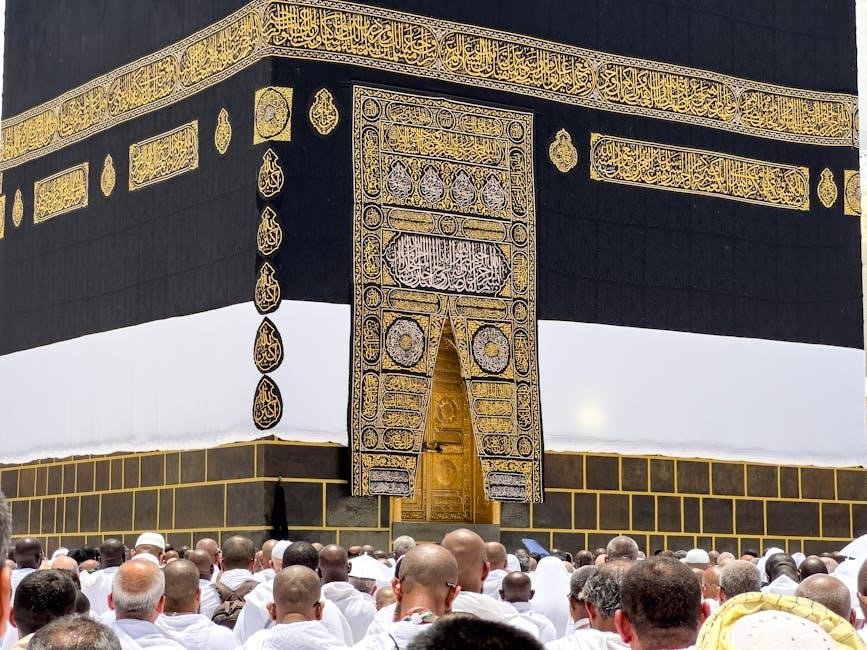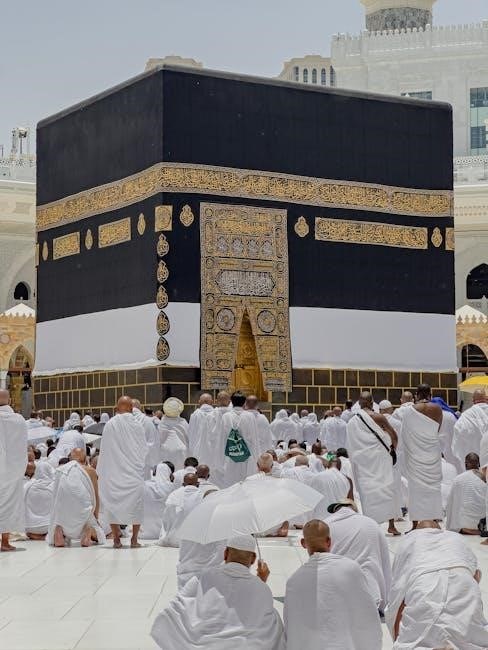Umrah, a minor pilgrimage in Islam, is a non-obligatory yet highly recommended act of worship. It can be performed at any time of the year, except during Hajj. Pilgrims enter the state of Ihram, perform Tawaf around the Kaaba, Sai between Safa and Marwa, and complete the ritual with a haircut or trim. Umrah is a spiritual journey that strengthens faith, seeks forgiveness, and fosters a deeper connection with Allah.

What is Umrah?
Umrah, often referred to as the minor pilgrimage, is a sacred Islamic ritual that involves visiting the holy city of Makkah to circumambulate the Kaaba, a sacred site for Muslims. Unlike Hajj, Umrah is not obligatory but is highly recommended as a Sunnah, following the traditions of the Prophet Muhammad (peace be upon him). It consists of four main rituals: donning Ihram, performing Tawaf (circumambulation of the Kaaba), completing Sai (running between Safa and Marwa), and trimming or shaving the hair. Umrah can be performed at any time of the year, except during the five days of Hajj, and is considered a means of seeking forgiveness and spiritual renewal. It is a unique opportunity for Muslims to draw closer to Allah and reflect on their faith.

Significance of Umrah in Islam
Umrah holds profound spiritual significance in Islam, serving as a means of seeking forgiveness, strengthening faith, and drawing closer to Allah. It is a Sunnah of the Prophet Muhammad (peace be upon him) and is highly recommended for its numerous blessings. Performing Umrah is believed to expiate sins committed between one Umrah and another, as well as to grant spiritual renewal and peace. It is also seen as an act of obedience and devotion, reflecting a Muslim’s commitment to their faith. The rituals of Umrah, such as Tawaf and Sai, symbolize unity, equality, and the remembrance of Allah. Through Umrah, pilgrims are reminded of the Day of Judgment and encouraged to reflect on their deeds and intentions, fostering a deeper connection with their Creator.
When Can Umrah be Performed?
Umrah can be performed at any time of the year, making it a flexible act of worship for Muslims worldwide. However, it is not recommended to perform Umrah during the five days of Hajj, as this is considered makruh (disliked). Pilgrims are encouraged to plan their Umrah outside this period to avoid any potential conflicts or restrictions. The flexibility of Umrah allows individuals to choose a time that suits their personal circumstances, whether it be during Ramadan, Eid, or any other season. This accessibility highlights Islam’s emphasis on making worship attainable for all believers, regardless of their schedule or location. By performing Umrah at an appropriate time, pilgrims can fully focus on their spiritual journey and connection with Allah.

Preparation for Umrah
Preparation for Umrah involves researching rituals, understanding requirements, and ensuring mental, physical, and financial readiness. Proper planning guarantees a smooth and spiritually fulfilling experience.
Step-by-Step Guide to Preparing for Umrah
Preparing for Umrah involves spiritual, physical, and logistical steps. Begin by researching and understanding the rituals to ensure compliance with Islamic guidelines. Remove unwanted hair, trim nails, and perform Ghusl before donning Ihram. Men wear two white, unsewn garments, while women wear modest attire. Organize essential documents like passports, visas, and tickets. Book accommodations in Makkah and Madinah, and arrange transportation. Financially, save for expenses and ensure emergency funds. Health-wise, consult a doctor, ensure vaccinations, and pack medications. Spiritually, repent, seek forgiveness, and resolve to avoid sin. Learn necessary Duas and prayers. Finally, depart early for Meeqat to perform Ihram without delay, ensuring a smooth and sincere Umrah experience.
Understanding Ihram and Its Requirements
Entering the state of Ihram is the first step of Umrah, symbolizing dedication to worship. Men wear two unsewn white garments, while women wear modest attire without face coverings. Before donning Ihram, pilgrims must remove unwanted hair, trim nails, and perform Ghusl or Wudu. The intention for Umrah is made at the Meeqat boundary. Once in Ihram, certain actions are prohibited, such as hunting, using scented products, or covering the face and hands for men. Pilgrims must avoid arguments and sinful acts, maintaining a state of purity and focus on worship. Understanding these requirements ensures a valid and spiritually enriching Umrah experience, aligning with Islamic teachings and the Sunnah of the Prophet Muhammad (peace be upon him).
Essential Items to Pack for Umrah
Packing the right items for Umrah ensures a comfortable and focused pilgrimage. Men should bring two sets of Ihram garments, which are simple, unsewn white clothes. Women can wear modest, comfortable attire suitable for worship. Include a prayer mat, a water bottle, and essential toiletries like toothbrush, toothpaste, and unscented soap. Comfortable walking shoes are crucial for Tawaf and Sai. Pack light, breathable clothing for Makkah’s climate. Bring a travel-sized Quran, a prayer timetable, and a list of essential duas. Don’t forget passports, visas, and travel documents. Medications, sunscreen, and a reusable water bottle are also vital. Avoid overpacking to maintain focus on worship and ease movement during rituals.
Health and Safety Tips
Ensuring health and safety during Umrah is crucial for a smooth and blessed experience. Stay hydrated by carrying a reusable water bottle, especially in Makkah’s hot climate. Wear comfortable, breathable clothing and sturdy footwear for extensive walking. Follow COVID-19 protocols and maintain personal hygiene to prevent illness. Be cautious in crowded areas to avoid accidents or pickpocketing. Carry essential medications and a first-aid kit. Stay with a group or family to ensure safety and assistance. Familiarize yourself with emergency contact numbers and nearby medical facilities. Avoid overexertion during rituals and take regular breaks. Respect local health guidelines and regulations to ensure a safe pilgrimage.
Financial Planning and Budgeting
Financial planning is essential for a smooth and stress-free Umrah experience. Start by budgeting for Umrah packages, which typically include flights, accommodation, and transportation. Consider additional costs such as visa fees, meals, and souvenirs. Compare packages from reliable tour operators to find affordable options without compromising on quality. Allocate funds for essential items like Ihram clothing, prayer mats, and personal care products. Plan for unexpected expenses by setting aside a contingency fund. Avoid overspending on shopping by prioritizing spiritual goals over material purchases. Keep track of your expenditures to stay within budget. Lastly, ensure you have sufficient local currency for small transactions during your pilgrimage.

The Rituals of Umrah
Umrah involves four key rituals: entering Ihram, performing Tawaf around the Kaaba, completing Sai between Safa and Marwa, and trimming or shaving hair. These acts symbolize devotion and humility.
Entering the State of Ihram
Entering the state of Ihram marks the beginning of Umrah. Pilgrims must make the intention for Umrah and recite the Talbiyah: “Labbaik, Allahumma Labbaik” (“Here I am, O Allah, here I am”). Men wear two unsewn white garments, while women wear modest attire. Before donning Ihram, pilgrims should perform Ghusl (ritual bath), trim nails, and remove unwanted hair. They must also avoid prohibited actions, such as hunting or using scented products. Ihram is typically assumed at one of the designated Meeqat points. This sacred state symbolizes purity and equality, preparing pilgrims for the spiritual journey ahead.
Performing Tawaf (Circumambulation of the Kaaba)
Performing Tawaf is a central ritual of Umrah, involving seven anticlockwise circuits around the Kaaba. Pilgrims begin by facing the Black Stone, placing their right hand on it, and reciting a supplication. Each lap is accompanied by specific duas, with the first three laps performed at a brisk pace (Ramal) for men. Women walk at a normal pace. Pilgrims must maintain modesty, avoid distractions, and focus on their worship. Tawaf symbolizes unity, devotion, and remembrance of Allah. After completing seven circuits, pilgrims offer two rakats of prayer behind the Maqam Ibrahim or in the mosque area. This act purifies the heart and strengthens spiritual connection.
Completing Sai (Running Between Safa and Marwa)
After Tawaf, pilgrims proceed to perform Sai by running between the hills of Safa and Marwa. This ritual commemorates Hagar’s search for water. Starting at Safa, pilgrims ascend, face the Kaaba, and recite duas. They then run to Marwa, repeating the process seven times. Men may briskly walk between the green markers, while women maintain a moderate pace. The journey symbolizes perseverance and trust in Allah. Pilgrims should maintain focus and recite supplications throughout. Upon completing Sai, the ritual is fulfilled, reflecting spiritual dedication and remembrance of divine mercy. This act is a pivotal step in Umrah, deepening one’s connection to Islamic history and faith.
Trimming or Shaving Hair
The final step of Umrah is trimming or shaving hair, symbolizing humility and equality before Allah. Men typically shave their heads, while women trim a small portion. This act marks the completion of Umrah and releases pilgrims from Ihram. It is recommended to perform this step with gratitude and reflection, seeking Allah’s forgiveness and blessings. The equality in appearance reinforces the unity of believers. After this, pilgrims may return to their normal activities, having fulfilled the rituals with sincerity. This act signifies the culmination of the spiritual journey, embodying submission and renewal of faith.

Post-Umrah Etiquettes
After completing Umrah, pilgrims should maintain humility and gratitude. Visiting holy sites like the Prophet’s Mosque in Madinah and the graves of companions is recommended. Show respect and follow local customs, ensuring a peaceful and dignified experience. Final supplications should be made, seeking Allah’s acceptance and blessings. Pilgrims are encouraged to share their spiritual journey with others, spreading knowledge and inspiration. This period is a time for reflection and spiritual growth, fostering a deeper connection with faith and community.
Visiting Holy Sites in Makkah
Makkah, the holiest city in Islam, is home to numerous sacred sites that hold deep spiritual significance. Pilgrims are encouraged to visit the Kaaba, the central point of worship, and the Grand Mosque (Masjid al-Haram), where millions gather to pray. Jabal al-Rahma (Mount of Mercy) and the Jannat al-Mualla cemetery are also revered sites. Visiting these places allows pilgrims to connect with Islamic history and the Prophet Muhammad (peace be upon him). It is recommended to perform additional prayers and supplications at these locations, seeking divine blessings. Maintaining respect and dignity while visiting these sites is essential, as they are considered sacred spaces for Muslims worldwide.
Visiting the Prophet’s Mosque in Madinah
Visiting the Prophet’s Mosque in Madinah is a deeply spiritual experience for pilgrims. This sacred site is the final resting place of Prophet Muhammad (peace be upon him) and is considered one of the holiest mosques in Islam. Pilgrims are encouraged to offer prayers, recite the Quran, and reflect on the Prophet’s life and teachings. The mosque’s serene atmosphere fosters a sense of peace and connection to Islamic heritage. It is essential to maintain modesty and respect while inside, avoiding loud noises and ensuring proper etiquette. Many pilgrims also visit the adjacent Jannat al-Baqi cemetery to pay respects to the Prophet’s companions. This visit is a humbling reminder of the Prophet’s legacy and a chance to seek divine blessings.
Etiquettes of Visiting the Graves of the Prophet and His Companions
Visiting the graves of the Prophet Muhammad (peace be upon him) and his companions requires utmost respect and adherence to Islamic etiquette. Upon arrival, pilgrims should greet the Prophet with the prescribed supplication, seeking blessings and peace. It is essential to maintain humility and avoid excessive emotional displays. Touching or kissing the graves is prohibited, as is raising hands in supplication directly to the graves. Pilgrims should perform a moderate prayer, avoiding overcrowding or disturbance to others. It is also forbidden to leave offerings or write on the graves. The visit should be a moment of reflection, gratitude, and seeking divine mercy, while adhering to the teachings of Islam and respecting the sanctity of the site.
Final Duas and Supplications
After completing the Umrah rituals, it is highly recommended to offer heartfelt duas and supplications. Pilgrims should pray for the acceptance of their Umrah, seek forgiveness, and ask for guidance and blessings. The Prophet Muhammad (peace be upon him) advised to supplicate sincerely, as this is a moment of divine mercy. Specific duas include asking Allah to accept the pilgrimage, grant spiritual growth, and bless future endeavors. Many scholars recommend reciting the Quran, especially Surah Al-Fath, and performing optional prayers. Pilgrims should also pray for their families, friends, and the Muslim community. These final supplications are a meaningful conclusion to the Umrah journey, reinforcing its purpose of spiritual renewal and connection with Allah.
Duas and Prayers for Umrah
Essential supplications and prayers for Umrah include specific duas during Ihram, Tawaf, and Sai. These prayers strengthen the pilgrimage’s spiritual significance and connect worshippers deeply with Allah.
Duas for Entering Ihram
When entering the state of Ihram, specific supplications are recommended to invoke Allah’s blessings and acceptance. The primary du’a is recited upon donning Ihram garments:
“Labbaik Allāhumma bi’l-ʿumrah.” (I respond to You for Umrah, O Allah).
This du’a signifies the pilgrim’s intention and readiness to embark on the sacred journey. It is also Sunnah to recite:
“Allāhummajʿal hādhā ʿumratan mutaqabbalan wa dhalikan dhamban mughfiran.” (O Allah, make this Umrah one of acceptance and forgiveness).
These supplications reflect the pilgrim’s sincerity and devotion, seeking Allah’s mercy and guidance throughout their journey.
Duas During Tawaf
During Tawaf, pilgrims are encouraged to engage in heartfelt supplications and remembrance of Allah. Upon starting Tawaf, it is recommended to recite:
“Allāhu Akbar, Allāhu Akbar, Allāhu Akbar, La Ilāha Illallāh, Allāhu Akbar, Allāhu Akbar, Wa Lillāhil-Hamd.” (Allah is the Greatest, there is no god but Allah, and praise be to Allah).
When reaching the Rukn al-Yamani, pilgrims may also recite:
“Rabbana Aatina Fid-Dunya Ĥasanatan Wa Fil-Ākhirati Ĥasanatan Wa Qina Ādhaban-Naar.” (O Lord, grant us good in this life and good in the hereafter, and protect us from the torment of the fire).
General supplications for forgiveness, health, and guidance are also encouraged, emphasizing sincerity and focus on the sacred ritual.
Duas During Sai
During Sai, the ritual of running between Mount Safa and Marwa, pilgrims are advised to recite specific supplications that reflect the spirit of worship and humility. At Mount Safa, it is recommended to say:
“Allahu Akbar, La Ilaha Illallahu, Wahdahu La Sharika Lah, Lahul-Mulku Wa Lahul-Hamd, Wa Huwa Ala Kulli Shaiin Qadir.” (Allah is the Greatest, there is no god but Allah, who has no partner. His is the dominion and praise, and He is over all things competent).
While moving between the hills, supplications for health, forgiveness, and spiritual growth are encouraged; At the completion of Sai, pilgrims may offer personal prayers, seeking Allah’s mercy and blessings, emphasizing the significance of this act as a means of seeking divine favor.

Travel Tips for a Smooth Umrah
Respect Saudi laws and cultural norms, stay connected with family via reliable communication, and prioritize health by carrying essential medications and documents for a safe journey.
Understanding the Visa Process
Obtaining a visa is essential for performing Umrah. Pilgrims must apply through authorized agents or online platforms, ensuring all documents, such as a valid passport, recent photos, and travel insurance, are submitted. The visa process typically involves selecting the right category, completing forms, and paying fees. Saudi Arabia offers e-visa options for eligible countries, simplifying the process. Processing times vary, so applying well in advance is crucial. Ensure compliance with visa terms to avoid issues. Proper documentation and adherence to guidelines ensure a smooth journey for Umrah.
Choosing the Right Umrah Package
Selecting the right Umrah package is crucial for a smooth and spiritually fulfilling experience. Consider packages that include visa processing, flights, accommodation, and transportation. Ensure the package aligns with your budget and preferences, whether luxury or budget-friendly. Look for reputable travel agencies with good reviews and experience in Umrah services. Verify if the package includes essential components like Ihram, Tawaf, and Sai guidance, as well as access to religious resources. Some packages offer additional perks like guided tours of holy sites or meals. Compare different options to find the best fit for your needs. A well-chosen package ensures a hassle-free pilgrimage, allowing you to focus on worship and spiritual growth.
Navigating Through Saudi Arabia
Navigating Saudi Arabia during Umrah requires careful planning and awareness of local logistics. Use detailed maps and guides to familiarize yourself with routes between Makkah, Madinah, and other holy sites. Public transportation, such as taxis and metro services, is widely available and efficient. Many pilgrims opt for private transfers or group tours for convenience. Ensure you respect local laws and customs, especially in holy cities. Download navigation apps like Google Maps or local alternatives for real-time directions. Additionally, consider language barriers and carry translation tools or phrases in Arabic. Staying organized and informed will enhance your journey, allowing you to focus on spiritual reflection and worship.
Respecting Local Customs and Laws
Respecting local customs and laws in Saudi Arabia is essential during Umrah. Pilgrims must adhere to the Kingdom’s strict regulations and cultural norms. Remove footwear when entering mosques, dress modestly, and avoid public displays of affection. Women are required to wear the hijab in public spaces. Respect prayer times by refraining from eating or walking in front of praying areas. Do not take pictures or videos inside holy sites. Keep the environment clean and avoid littering. Be mindful of local etiquette, such as using the right hand for eating and giving items; Violating laws, even unintentionally, can lead to serious consequences. Always follow instructions from local authorities and maintain a respectful demeanor throughout your journey.
Staying Connected with Family and Friends
Staying connected with loved ones while performing Umrah is crucial for reassurance and sharing your spiritual journey. Before traveling, ensure your phone is compatible with Saudi Arabia’s networks and consider purchasing a local SIM card for affordable communication. Use messaging apps like WhatsApp or Telegram to keep family and friends updated. Share your itinerary and accommodation details for emergencies. Download maps and translation apps to navigate Makkah and Madinah seamlessly. Inform your family about your daily schedule and rituals to maintain transparency. Additionally, many Umrah guides offer tips for staying in touch while respecting local customs and focusing on your pilgrimage. Regular updates can provide peace of mind for both you and your loved ones during this sacred journey.

Additional Resources for Umrah
Download comprehensive Umrah guides, including PDF manuals, books, and apps, offering detailed instructions, essential supplications, and practical tips for a smooth pilgrimage experience.
Recommended Books on Umrah
Several books provide detailed guidance on performing Umrah, including “Hajj and Umrah Guide” by Sh. Muhammad Alshareef, which offers step-by-step instructions and essential supplications. Other notable resources include “Umrah: A Step-by-Step Guide” and “The Umrah Handbook,” both offering practical tips and spiritual insights. Many of these books are available in PDF format for easy access, ensuring pilgrims can prepare thoroughly. They cover topics like Ihram, Tawaf, Sai, and post-Umrah etiquettes, along with Arabic supplications and their translations. These books are invaluable for understanding the rituals, significance, and spiritual benefits of Umrah, helping pilgrims perform the pilgrimage with sincerity and correctness.
Useful Apps for Umrah Guidance
Several apps provide comprehensive guidance for Umrah, such as “Umrah Guide” and “Hajj & Umrah Navigator,” offering step-by-step instructions, prayer timings, and rituals. Apps like “Ihram Tracker” help pilgrims monitor their Ihram status, while “Mecca Maps” provides navigation within holy sites. “Dua for Umrah” includes essential supplications with Arabic text and translations; These apps are designed to simplify the pilgrimage process, ensuring pilgrims adhere to rituals and stay informed. They often feature offline access, making them indispensable for travelers. By utilizing these tools, pilgrims can enhance their spiritual experience and perform Umrah with greater confidence and correctness.
Downloading the Umrah Guide PDF
Downloading the Umrah Guide PDF is a convenient way to access detailed instructions, rituals, and essential information for performing Umrah. The PDF typically includes step-by-step guides for Ihram, Tawaf, Sai, and hair trimming, along with recommended duas and prayers. It also covers preparation tips, visa processes, and health advice. Many resources offer free downloads, ensuring pilgrims have offline access to critical information. The PDF is designed to be portable, making it easy to carry and reference during the journey. By downloading this guide, pilgrims can ensure they are well-prepared and informed, allowing them to focus on the spiritual aspects of their pilgrimage. It serves as a valuable companion for a smooth and meaningful Umrah experience.
Umrah is a profoundly transformative spiritual journey that offers pilgrims a chance to reconnect with their faith and seek divine forgiveness. By adhering to the rituals of Ihram, Tawaf, Sai, and trimming or shaving hair, pilgrims fulfill a sacred act of worship. The Umrah Guide PDF serves as an invaluable resource, providing clear instructions, essential duas, and practical advice to ensure a smooth and meaningful experience. Whether performed individually or with a group, Umrah is a testament to one’s devotion to Allah. As pilgrims return home, they carry with them cherished memories, renewed faith, and a heart filled with gratitude. May Allah accept the Umrah of all pilgrims and bless their journey with His mercy and grace.
